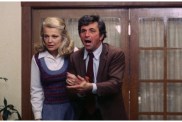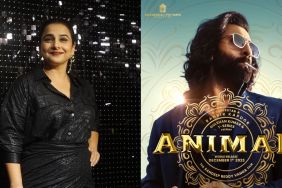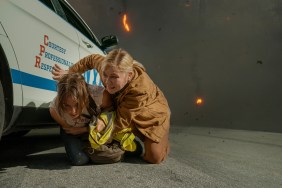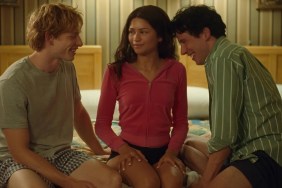You probably couldn’t get an odder duo to interview than filmmaker Mike Leigh (Secrets & Lies, Vera Drake, Topsy-Turvy) and actress Sally Hawkins, the star of Leigh’s new movie Happy-Go-Lucky, and yet together, the two of them have made what is probably one of the most delightful movies of the year.
In Leigh’s last film Vera Drake, Hawkins played a woman forced to get an abortion after being raped, but in the new film, she plays London native Poppy, a chronically and deliriously cheerful woman who always has a smile on her face, a twinkle in her eye and a snappy quip on her lips. She lives a seemingly mundane life as a schoolteacher, but when she decides to learn how to drive, she’s faced with her toughest challenge, an equally cranky driving instructor named Scott, played by the equally brilliant Leigh regular Eddie Marsan. In between their time together driving around London, we get an overly-emotional flamenco teacher, a family gathering with Poppy’s less cheerful sisters, and other snapshots from Poppy’s rather complicated lifestyle, all used to create a portrait of a realistic person unlike anything we’ve seen in previous films, even from Leigh.
Leigh is an amazing filmmaker, having been nominated and won many awards for his work, and though he has a reputation for being a terse and tough interview subject, he’s amazingly modest in the amount of credit he transfers to the actors with whom Leigh collaborates with for months while assembling every film.
ComingSoon.net sat down with Leigh and the divine star of his latest film when they came to New York to premiere the movie at the New York Film Festival. Admittedly, we were slightly nervous to talk to Leigh, having seen him take down far more reputable interviewers in the past, but Hawkins was there to keep things friendly, as she added her own thoughts while being clearly amused whenever her director had us on the ropes. (She has such a delightful laugh that it was worth it!) We were able to talk about the movie and the intricate and rather secretive method in which Leigh and his actors collaborate on creating his films.
ComingSoon.net: Did you go about making this movie via the same approach as every other movie you’ve made before, including “Vera Drake”?
Mike Leigh: Guess.
CS: Um… Yes?
Leigh: Yes, you got it. (Sally Hawkins finds this exchange funny and giggles.)
CS: I would think that because “Vera Drake” had a very specific subject matter…
Leigh: Well, it’s different. Each one is different, you know. There’s a film out there I made which is about adoption-related issues, there’s a film I made about 19th Century theater. Each film is different and this film is absolutely its own thing, you know, but if you’re asking me about the mechanics of getting them down, they’re all the same.
CS: But as far as going into this, did you have a specific subject matter you wanted to explore?
Leigh: You know, yeah, I had a specific subject matter called “life.” It’s people and I just have a sense of the spirit of the thing, so if you’re actually asking me if I think this is about a teacher or about education, well those are things… I have a whole lot of ongoing preoccupations, many of which you can identify popping up time and time again, but also there’s stuff that you think well actually I think somehow, “Oh, I need to get around to that sometime” but here, I just had a sense of the spirit of the thing, that’s all that was. The answer is it’s what you see on the screen. The other thing central to this film is this lady sitting here. I just wanted to make a film where she was at the center of things, because she’s in the last two films, and she’s very brilliant, and I just wanted to explore the possibility of making a central character that would be what I knew we could do together, and what you have is precisely that.
CS: This is a very different character from the one you played in “Vera Drake,” so what did Mike tell you when he first told you he wanted to make a movie with you as the featured star. Did he have anything or was it just a matter of going into it for six months knowing that you’d work something out?
Sally Hawkins: Yeah, absolutely. That’s what’s great. It’s a completely different experience, adventure and journey, and you don’t really know where you’re going to end up and how you’re going to get there.
Leigh: It’s exploring.
Hawkins: Yeah, for me, the experience it’s always different. In “Vera Drake,” I was in my own bubble a little bit more, but that was guided and good because emotionally, she was in her own bubble, that was the case of Susan Wells in “Vera Drake” and here, Poppy’s a social being, so that was very different, and I was engaged for a longer period as well, but the process of getting there and getting the character is exactly the same.

Leigh: Although I think it’s important to say that it’s very healthy in this case that Sally plays the central character and, but for a couple of tiny moments, is in every scene essentially, and in that sense, anyone could be forgiven for saying that it’s kind of a… it’s not a solo thing but actually, in practice, the process of doing it is very much an ensemble thing, although you haven’t got an ensemble of everybody performing together in the same thing, although there were very much one-scene parts. Nevertheless, at any given point in the proceedings, the way that Sally was working with other people, interacting her sisters or Zoe as played by Alexis Zegerman, the flatmate, or any of the other characters, there was never a sense that everybody was working with a star or anything. That’s not how it works.
Hawkins: God no.
Leigh: I never actually said to Sally, as such, “You will be playing such and such a character.” She may deny it.
Hawkins: Yeah, but never said it and you don’t work like that, which is great. As Mike says, everyone’s equal and everyone’s doing that incredible amount of work on their characters for months, so you’ve got this incredibly rich and creative world, in that no one character is really…
Leigh: Well, if you’re acting in a film and you just come in and do one scene for a couple days, and you’ve been sent the script and you know that it’s a minor character, and you know all about the rest of it, it’s going to be much more difficult to… whereas here, the resonance and depth of what Stanley Townsend does as the homeless person or what Karina Fernandez does as the flamenco teacher, you name them. It’s because everybody really only knows about what their character’s world is and everybody has spent plenty of time working with me one-on-one and we’ve created the characters in exactly the same way, and they’ve gone off and researched and all this stuff, but at the end of the day, it’s a film and it’s a story and it’s about this woman called Poppy.
CS: Do you ever have the entire cast together in the same room at any one point in the process, whether it’s in rehearsals?
Leigh: Twice. Once at the very, very beginning when I get everyone together and I explain the principle of what we’re going to do, so they can all say “hello” and “goodbye” to each other for the last time, and another occasion… because nobody knows what anybody else is doing, they may overlap if they arrive for a rehearsal and have no idea why the other person is there as they leave, but there is something I do, which we will not tell you aboutit’s our businesswhere I do get the whole cast together for a couple of days and we do something.
Hawkins: Magic happens.
Leigh: But that’s just a technicality.
CS: I loved Reg in “Vera Drake” and I’m a big fan of Eddie Marsan in general, but how does he go from playing Reg to playing Scott, because it’s such a completely different turnaround for him.
Leigh: You don’t. The truth is you don’t… you don’t go from Susan to… first of all, apart from everything else, you have to rememberand this is very importantis that Sally has doneif you take out the three parts in my filmsapart from that, her portfolio of brilliant performances in other things, films particularly, is fantastic. I don’t know if you’ve seen “20,000 Streets Under the Sky” or whether you saw “Persuasion” that she did for television.
CS: I think a lot of her previous stuff doesn’t get over to the United States unfortunately.
Leigh: No, well there’s a lot of stuff… and the same is true for Eddie. He’s been in a lot of movies, as you know, so the point is you’re talking about us with lots of other actors in the film, you’re talking about people who are consummate professionals, who’ve got a wide range of experience that they bring to the (table). The only person who works on my films who has a very narrow experience of a certain kind of film… is me.
Hawkins: (laughs) That’s a good way of looking at it!
Leigh: I mean, the cinematographer does all kinds of different things, everybody does. I’m surrounded by people who work in all kinds of movies all the time, so it’s only me…
Hawkins: But people want you to direct, they keep throwing scripts at you.
Leigh: Well, they don’t actually.
CS: At least to me, it seems like every movie you’ve done is fairly different.
Leigh: Within the genre. Yes, I like to think so, although I suspect also that you can easily tell that they’re mine. “Vera Drake” does have its comedic moments…

CS: That’s true; I thought Reg was very funny. As far as improvising and coming up with the dialogue, Poppy’s quips are quite amazing, and I’m not sure if those came from improvisations but whoever wrote those should be writing comedy regularly.
Leigh: Well, everything you hear, massive amounts comes from improvisation and some of it comes out of discussion and some comes from other things I suggested. At the end, what we don’t do is we don’t say “I thought of that. You can’t say that unless I think of it.” It’s a collaboration and we arrive at something like all kinds of collaborators, we derive benefit from the very process of collaboration. But in the end, there are strict disciplines. Nothing that happens… Poppy wouldn’t do anything that isn’t in character, and if I said, “Couldn’t she do or say this?” and Sally says, “Actually that doesn’t feel right” then that’s it, but at the same time, if she says, “I want to do this” and I say, “That doesn’t feel right for the narrative or character” then that’s it, because I have the last word, but anyhow, it works.
Hawkins: Yeah, and you know every single character as in-depth as the actors do, because Mike’s there 100% of the time.
Leigh: The characters go into my bloodstream as well in a way, so I can sense…
Hawkins: What’s right and what’s wrong. It’s like you’re completely in-sync in an almost telepathic way, and that’s what’s lovely and complete trust that Mike knows exactly where Poppy’s head is and what is right for her. He sort of fits into every characters’ shoes and can instantly morph and for me, that’s what it feels like. It’s so lovely because you can relax.
Leigh: Well, you can be creative. For me, it’s about elevating actors to the status of proper artist, which doesn’t happen too much.
CS: One thing I really liked about Poppy is that this is one of the most layered and rich movie characters I’ve seen. Good film characters tend to have depth, but we never see them going through very different parts of their lives, however mundane. Real people tend to act differently depending on who they’re talking to, something we don’t really see much in the way people are depicted in movies.
Leigh: You mean, characters in other movies? They usually serve the plot.
Hawkins: And have to hit certain beats. What’s lovely is you have that freedom to explore a fully rounded multi-faceted human being, in an incredibly rich way, and whether Mike decides to show every side is another thing, but there’s much going on. They’re very complex at any given one point. There’s many things, as there is in life.
Leigh: That’s because we create these characters in a three-dimensional way, and then we find the film, the narrative, so in a way, they come already multi-layered as it were.
Hawkins: Yeah, yeah…
CS: Well, you did do that with this great character. How do you think you’d personally feel if you ever encountered someone like a Poppy or a Scott in real life?
Leigh: Well, what kind of a question is that? I don’t know if this is going to answer your question but I think personally that one of the things that Poppy’s story is about is… Scott is totally, fundamentally, clinically devoid of a sense of humor, and Poppy has massive…
Hawkins: It’s in there, it’s just very deeply hidden.
Leigh: I don’t think so. Poppy has this enormous sense of humor and Poppy like all of us with a highly-developed sense of humor when confronted by someone devoid of one, it brings out the worst in us really.
Hawkins: Yeah, yeah, she becomes a little minx.
Leigh: So certainly the Scotts in this world bring out the worst in me, that’s for sure.
Hawkins: (laughs) They wouldn’t last for a minute!
Leigh: I make films about them.
Hawkins: (still laughing) Put them up there.
CS: You’ve both done a lot of Q&A’s for this so have you found that people have been able to relate to one character or another or both?
Hawkins: What’s lovely about hearing those Q&A’s and being present when different characters appeal to different people and you have, for example, some people really relate to the relationship between the two women and Zoe, Lexi’s character, so it’s always changing.
Leigh: Yes, absolutely.

CS: Now that you’ve done three movies together, do you find that doing comedy or drama is harder than…
Leigh: No, no, no… that is a question that’s based on a premise that doesn’t exist. There’s no difference. This film is a drama. This film is not a comedy as opposed to a drama. We’ve made this film with exactly the same spirit, with exactly the same seriousness, with exactly the same sense of humor, the same sense of people and exactly the same way according to the same criteria. This film, when those moments occur and there are quite a lot of them in the film that are not funny, they’re just as solid as the moments in “Vera Drake” and there are moments in “Vera Drake” which absolutely could be included in any compilation of comic moments in films. With respects, there’s no question of approaching this differently because it’s a comedy, because it isn’t. I mean, it’s a comedy in the Jacobian sense.
CS: But how about for you as an actor, Sally? I’ve spoken to a lot of actors who do really tense or dramatic films, who’ve said that it’s sometimes hard to walk away from it and leave that behind. When you’re playing a character like this who is always happy, are you able to turn her off?
Hawkins: You mean at the end of the day? Well because of the discipline that’s instilled very early on in the process, Mike is very strict about the guidelines that you leave the character at the end of the day. You step in and out of character and that’s why you refer to your character in third person and that’s instilled right from the beginning and that’s incredibly important.
Leigh: That is important, but at the same time, you can’t help in a way living with her for a while.
Hawkins: No, no…
Leigh: Some actors who’ve played very depressing characters for a long stretch… I mean Johnny got to David Thewlis a bit, Cynthia got to Brenda Blethyn a bit. Now I know that Poppy got to you a bit, but actually, interesting enough, in a positive way. It actually helped you.
Hawkins: Totally, totally, and I’d just been thinking of that. I had a view of life and being in her head and looking at the world through her eyesit was quite wonderful really.
Leigh: I mean, people have asked me about Sally and is she really Poppy, and the answer is “no” because I know that Sally has her dark side, that Poppy doesn’t, although Poppy would empathize with that, but in a way you have much more of a dark…
Hawkins: Yeah, well I worry more and what I learned from her is her ability to let go and to flow and she’s cheeky. It’s on the edge of my lips, but she doesn’t judge herself, but I’m still learning.
CS: It’s funny that you bring up worrying because in a way Scott is right, this is a world where there is tension and worry, so do you feel there should be more people like Poppy, who are more compassionate, less judgmental and more care-free?
Leigh: Obviously. It would be eccentric to say no. Of course there should.
Hawkins: Definitely.
CS: The problem is that when people who are always cheerful like that come along, people tend to be put off by them.
Leigh: Well, that’s their (problem).
Hawkins: It depends where they are.
Leigh: I suppose in a way the disappointing or depressing thing about a lot of the reactions to this film in some quarters is that people are worried and people are suspicious of the Poppys, and I think it’s very sad, because this woman is obviously… I mean, it is not a naïve picture of some kind of unadulterated bliss, as though she’s on magic mushrooms or smokes tons of dope. It’s about a woman who is focused and intelligent and committed and serious and responsible and all those things… but has a great sense of humor and a great joie de vivre and a great care and compassion, and that’s what it’s about basically. And if you’re going to be cynical about that, well it’s sad.
CS: We do see when she’s with the kids that she can turn it off.
Leigh: Oh, yes, she’s for real.
Hawkins: Totally, and like what you were saying about the comic and the tragic, in the case of the scenes especially towards the end of the film with Scott, when it was quite heightened, she was using her humor but there was something else going on entirely. She was using humor as a weapon at that point almost.
CS: Not sure how to address this and this might come off as somewhat cheeky…
Leigh: Cheeky? Try it.
Hawkins: (laughs)
CS: I was just curious how you feel about how your movies translate to places outside England.
Leigh: Why is that cheeky?
CS: There are things in the movie which are obviously very British…
Leigh: Well, as far as I’m concerned, this is not a film about England or about London or anything British. It is on one-level, that’s it’s milieu, and our particular territory, but it is universal and actually it translates very well. I mean it’s done extremely well, I mean it’s doing wonderfully in France, it’s doing very well in Germany. It travels basically.
CS: I was thinking more of the language and the slang which is very specifically British.
Leigh: That’s true, but that’s only a limited limitation.
CS: I know you don’t like talking about the process before shooting but are there rehearsals and is it possible to over-rehearse things and still have something left to capture just when you’re shooting?
Leigh: The art to piloting a jumbo jet across the Atlantic and making it land in exactly the right place involves a whole lot of judgments and skills, and the same applies to piloting this jumbo jet.
Hawkins: (giggles) That’s a great answer.
Mike Leigh’s Happy-Go-Lucky opens in select cities on Friday, October 10.









